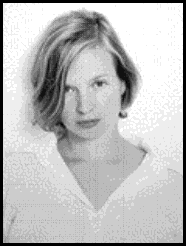Jenny Erpenbeck
Susan Bernofsky,
Translator
(New Directions)

- Hermine and Arthur, his parents.
He himself, Ludwig, the firstborn.
His sister Elisabeth, married to Ernst.
Their daughter, his niece, Doris.
Then his wife, Anna.
And now the children...
--- so many that the reader may become confused, as in one of those heavy Russian novels, where the names keep sliding about, Pierre (Pyotr Kirilovich) Bezukhov, Andrei Nikolayevich Bolkonsky, Anna Fedyorovich Skolitikov, Mishkin.
Sometimes the characters in Visitation--- Ludwig, Elisabeth, Anna, Doris --- change themselves into titles: "The Subtenants," "The Visitor," "The Writer," "The Cloth Manufacturer," so that after awhile you just give it up.
Because the main character in Visitation is a plot of land, a part of the Brandenburg estate, there on the Märkisches Meer ... the land that since 1650 belonged to the mayor Wurrach and his daughter, Klara who, unfortunately, when she was wandering alone about her land, came across a fisherman from across (or under) the lake, and they sit down together, and
- The fisherman lays his head down in the lap of the mayor's youngest and as yet unmarried daughter, and she begins to dry his wet shock of hair with her skirt.
Later a neighbor reports that whenever Klara appears to her land, "she sits down in the grass, leaning her back against the oak tree and propping her feet on the upside-down bucket, and talks with the air or else is simply silent." She begins to hide about the farm, "Everywhere on the farm and on the property, the sisters and farmhands have to be prepared to come across Klara. She can often be heard wailing or arguing in some hiding place or other, but if you pull her our, she is always quiet and friendly."
So born of the years, and then madness, the property ends up in the hands of the architect who builds a cottage here for his wife: the architect, who, apparently, "worked with Albert Speer on the Germania project." He ends up as a fugitive in the DGR, runs to West Germany.
The house and the land become the constants in Visitation, much as Dublin becomes a character in Ulysses, Africa in Heart of Darkness, the Mississippi in Huck Finn. The house and the land are fixed, although owners change when the Nazis take over, change again when the Russians arrive, stabling their horses in the garden. And finally it changes one more time when the exiles return from Siberia.
The beauty here is in the writing. This on the children playing: they "hide in the secret closet in her room under the coats and dresses or go to his house, where the television would be on even during the day, and watch the black and white cowboys galloping across a black and white plain and eventually their black and white falling down and dying."
Or, when one of the "subtenants" finds --- anonymous call --- that she has a sister, one that she has never known, so
- Any older woman sailing past her on a boat might be her sister. Or the madwoman who always pushes around an empty shopping cart in the nearby spa town, mumbling curses. A woman sitting in a café with a piece of cake. An energetic sixty-something seeking a non-smoking man in a classified ad, or else some scrawny old biddy in Berlin.
There are the asides, which are wonderful: "Happiness grows out of disorder, just as infinity grows out of the finite lake on which he is now turning his back."
- He and his wife spend their weekends in a toolshed, tie up their sailboat to a dock that doesn't belong to them, and are nonetheless, he would say, utterly and completely happy on this parcel of land that they have conditionally borrowed.